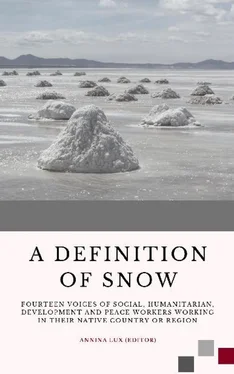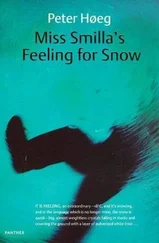Fourteen voices of social, humanitarian, development and peace workers working in their native country or region
Edited by Annina Lux
With the VOICE Team:
Catherine Banner
Sheila Chepkoech
Caterina Belardi
Barbara del Bosque Salmerón
Anouck Teiller
Alena Gold
Florian Wintermeyer
Philina Tempelmeier
Alexander Punter
Jonas Lux
All profits from the sale of this book will be donated to PEN International.

Text copyright © 2019 by Annina Lux and VOICE writers
Published by Annina Lux, Project VOICE – Projecting Voices, Post Box 31 10 52, 10640 Berlin, Germany
(mail to: info@projectingvoices.org)
Translations for ‘The Work of a Medico General in a Rural Hospital in Bolivia’, ‘The Challenge of Practising Medicine in an Underdeveloped Country’ and ‘A Traumatic Journey to Freedom, Democracy and My Own Free Will’
© Annina Lux
Cover image: Salar de Uyuni, Bolivian Salt Desert © Annina Lux
All opinions expressed in these stories are those of the
individual VOICE writers and do not necessarily reflect the opinions of Project VOICE or of the editor or the VOICE team. VOICE is not affiliated with and does not necessarily support the writers' organisations or those mentioned in this book, and does not necessarily agree with their positions and opinions. All pictures supplied by the writers are reproduced with permission by the writer, who holds the responsibility for ensuring legal, fair and ethical use. The responsibility for verifying all statistics rests with the writers. To protect the identity of individuals mentioned in the stories by our writers, names have been changed or omitted where necessary. All information contained in stories is correct at the time of publication.
Printed by epubli – a service of neopubli GmbH, Berlin, 2019
Annina Lux
Annina is the project coordinator and founder of VOICE and the editor of A Definition of Snow . She founded VOICE after working for five months for an international humanitarian organisation in a rural hospital in Bolivia.
One of the most vibrant memories from my time in Bolivia is about snow, or rather the absence of it. Bolivia is as diverse in geography as it is in language and culture, and while snow can be found in some parts of the country, my workplace was far away from all of them. Working in the local hospital, many of my colleagues started to gain an interest in what Germany, my home country, and Europe in general looks like. Many of our conversations on the differences between the two countries were about the weather, one of the favourite topics of my Bolivian colleagues. Following a particularly humid heat wave in the Bolivian rainy season, with temperatures going above 40 degrees Celsius and the humidity making you dream about having a cold shower whenever the running water was working, I came to work on the first morning of comparative coolness – 30 degrees Celsius – to find my colleagues telling me they were cold. I smiled and told them that temperatures drop below zero in Germany in winter, and often much below that. They looked at me in awe. There are many places in Bolivia where it gets as cold or even colder than that, and while travelling I had spent some freezing nights and days both in the Salt Desert and climbing a glacier near La Paz. But none of my colleagues had ever been to either of these regions. So I told the particular colleague and friend I was talking to that in Germany, there is snow in winter. He looked at me curiously and asked me what snow was like. And I found myself carefully thinking about ways to describe snow to someone who had never touched or seen it.
For me, snow had always been part of my life. My parents and grandparents pulled me around in a sledge before I could even walk, I started skiing when I was three and spent plenty of time in my childhood playing in the snow with my siblings and friends. Snow and all activities related to it have always been a highlight of my year, and when I was old enough I started quizzing our skiing instructor about the different types of snow. I spent a considerable amount of time reading up on avalanches, and one year our instructor even patiently took us to dig out a snow profile and categorise the different layers of snow within it. So, while I am certainly not an expert, snow is in no way a foreign concept to me and has been part of my life ever since I was born. Yet I struggled to define snow for my friend, who listened attentively to my attempts and occasionally interrupted with a question. When I next spoke to my family, I asked my mum to send me some of the chemical snow which, mixed with water, looks very similar to powder snow, and asked my dad, sister and brother for photos and videos of snow-making machines, piste-bashers and snow-mobiles, to supplement my explanations.
On my monthly free weekend, I went to the departmental capital to collect the chemical snow and download the array of photos and the video of a snow-making machine that my family had sent. When I showed my friend that video, he looked at me suspiciously and told me that he wasn’t falling for the joke, that clearly I was showing him a scene from a science fiction film. It took me a significant amount of time to convince him otherwise. It was the chemical snow, however, that fascinated him most. He carried it around the hospital the entire day and showed it to all the staff, and in particular to our mutual friend, the X-ray Technician. She looked at it cautiously and asked him what snow was. And he tried to explain, recycling what I had told him multiple times, looking at me questioningly every couple of seconds. I corrected what he got wrong and added explanations where he missed essential parts. In the end, our friend looked at him somewhat puzzled and asked me to explain again. Because, despite having listened to hours of explanations and having spent weeks looking at pictures, watching videos and quizzing me, my friend, who had never been outside the town’s particular climate zone, was unable to define snow.
In the weeks and months after coming back to Eu-rope, my family, friends, colleagues and even total strangers asked me about my experiences in Bolivia. I was happy to share many of them, and I talked about the hospital and my work there. But very quickly, I realised a crucial perspective was missing – that of my Bolivian colleagues, who had grown up in Bolivia, who had worked at the hospital and the town for years, and who continue to work there every day. While my experiences were very interesting for those I talked to (or so I hope), and my perspective was certainly a valid one, I reminded my audience that it was a very particular one – that of a then 21-year-old Emergency Medical Technician who went to work in a Bolivian hospital for half a year. Of course, I knew a considerable amount about the country, the region, the department, the town, the hospital. I had worked there almost every day and many nights for five months, and I had integrated very well. But this was still only part of the story. So I tried adding some of the perspectives of my Bolivian colleagues and friends. And I found myself thinking of that moment again. Memories of my friend trying to explain snow flooded back to me while speaking. Talking about my colleagues’ experiences felt like defining snow after having a somewhat limited insight into the notion. It is hard enough to try to comprehensively explain something that we have known and interacted with all our lives to someone who has not. It is impossible to do so with something we have only had relatively short contact with. Just as my friend could not fully define snow, neither could I fully define my colleagues’ perspectives.
Читать дальше





![Serg Aill&Lex Lux - Идефикс. Жажда силы [СИ]](/books/422633/serg-aill-lex-lux-idefiks-zhazhda-sily-si-thumb.webp)







